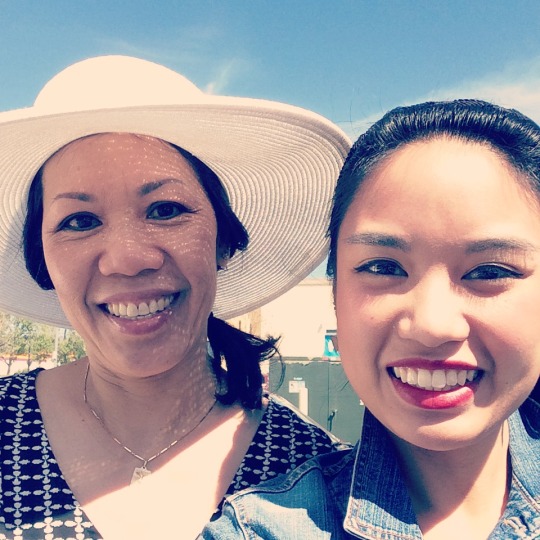BY CECILIA TRAN

The author and her mother partaking in their favorite past time: selfies.
My mama is the kind of person you hear before you see. As a painfully shy child, I was amazed at how she always had something to say. While I was struggling in my elementary school ESL classes, opting to sit through recess in silence, my immigrant mother was a chatterbox, gabbing away with the other parents, in her rough English.
“Oh, hi! I’m Bích, Cecilia mom,” she would say. “Like the pen: B-I-C, Bic. Nice to meeting you!”
By middle school, I’d moved on from ESL classes and successfully wiped away all traces of my own accent. I never said anything other than the occasional English correction under my breath, but I was embarrassed by my mama’s loud choppy sentences and her uninhibited use of Vietlish.
I kept wishing she was the quiet, meek immigrant mom others assumed she would be. But she wasn’t. She could never gauge the appropriate volume for her speaking voice, particularly when she got excited about the most random things, like Angelina Jolie adopting a Vietnamese baby. At church, she’d sing her own interpretations of church hymns at full blast, as I cringed inside.
There is no neat anecdote for me to explain just when I began learning to embrace my mama for the fierce, outspoken woman that she was. In reality, it has taken a collage of moments that began when I first started to learn and accept my identity. It took moments like joining the Southeast Asian Student Coalition at Berkeley, sharing, for the first time, the story of my mother’s refugee journey, and realizing how amazing it was that, despite everything, she still had the strength and resilience to laugh. It took watching her help dozens of relatives pass their citizenship tests and SSI interviews – bossy, broken English and all.
Sure she had trouble pronouncing the word “world,” which came out something more like “were … roll,” but she could memorize the names and uses of 20 different medications and conduct complicated dialysis procedures for her older sister. I slowly came to not just hear her but to see her for all that she was.
One day, my mama called me from the parking lot of her workplace, where she soldered together software chips under a microscope for hours on end:
“I know I’m bad, really bad,” she said, recounting an exchange with her supervisor. “Shouldn’t talk back, but I can’t take it! He always so mean to me!”
“Mom…”
“I’m a bad Catholic, huh? I know I should turn the other cheek and it’s not the Catholic way. I was shaking and shaking and I have a temper but he always picks on me and— ”
“Mom!”
“—What, con?”
“That’s the most awesome thing I’ve ever heard. I’m so proud of you for being such a badass!”
“Don’t say bad words… And thanks, con.”
I could feel the full width of her smile through the phone.
